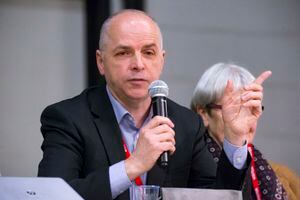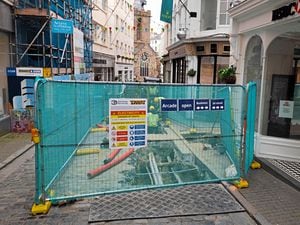It’s easy to declare climate and ecological emergency
DECLARING a climate and ecological emergency is the easy bit, said Environment & Infrastructure president Barry Brehaut – the more complex work is the actual delivery of environmental policy and projects.

His comment follows pressure from the Extinction Rebellion Guernsey group, which wrote to each deputy asking them to declare a climate and ecological emergency.
The UK and Republic of Ireland have declared emergencies, as has Jersey.
‘There are a myriad of different work streams that will help us to meet our international obligations,’ said Deputy Brehaut.
‘If we are serious about dealing with the most pressing global issue then we cannot shy away from putting in place those mechanisms that deliver the most positive environmental outcomes.’
Assistance with purchasing electric vehicles, continued support for the bus service and ensuring homes are well insulated were just some of the things he suggested that could be achieved.
‘There will need to be a change in political mindset, the States have shown in the past that they are not universally supportive of projects that have clearly been informed by best environmental practice.
‘There has even been resistance to our very modest advances in promoting biodiversity projects with their very obvious rewards. That has to change, it’s what the public expect, and more recently demand.’
Deputy Peter Roffey has long felt the States should be following a more active environmental agenda and doing more to combat climate change.
‘Sadly those who have promoted such an approach over the years have tended to encounter a lot of resistance – even scorn – both within the States and from the wider community,’ he said.
‘I believe – although it may be wishful thinking – that public attitudes have recently changed quite profoundly in this respect and there would now be much more support for a proactive environmental approach by the States.’
He hoped the current Assembly would take this opportunity to do something really meaningful in the last year of its term.
As for whether declaring a climate change emergency was a necessary precursor to real action, he had mixed views.
‘I have been in no doubt that such an emergency has been patently clear for many years.
‘I respect the fact that some feel a formal declaration would galvanise the States into action, but I really worry it could create the opposite effect with deputies able to say “well, we’ve done something” when such a declaration would be just empty words without real reforms.’
However, he could not vote against a proposal to make such a declaration because it was undeniably true.
‘I really respect the campaign that these young people [James and Charlotte Cleal at the Grammar School and Sixth Form Centre] have carried out but I prefer to be judged on outcomes rather than promises and therefore have declined to sign up – but that could be because I am a grumpy old man who dislikes gestures.’
He noted that Policy & Resources lead Deputy Gavin St Pier has signed the pledge and said he would be pleased to learn of the raft of radical policies which ‘will no doubt flow from that’.
Deputy Laurie Queripel did not sign the 2030 pledge that the Grammar students wrote up.
He believed signing pledges was not a very meaningful exercise, despite good intentions. Rather, what is needed are some well thought out and considered action plans.
‘Whatever one’s views on climate change and its causes, it clearly makes sense for communities and individuals to live in a more sustainable and environmentally friendly manner.
‘Practical things like education and raising awareness in relation to consumer choices is something that could be advanced, it doesn’t all have to be about additional green taxes.’
He was wary of the extra taxes approach, deeming them a default and somewhat lazy option which, if not crafted well, could end up adding to the burden of people who were already struggling financially.
‘We already have a number of what could be termed green taxes in play, waste charges and fuel duty among them. I believe we can get islanders to more carefully consider their consumer and lifestyle choices without taking a great deal more out of their pockets.’
Deputy Queripel said the problem was more macro than micro: although it is a positive start, driving less is insignificant compared with the effect of multinational corporations cutting down rainforests to produce things such as palm oil.
‘So yes, let’s think about what we can do as individuals but also as a States we should be lobbying and pressuring other governments to review and curtail or at least reduce these practices,’ he said. ‘Along with challenging manufacturers and retailers to review their practices – in packaging and so on.’





